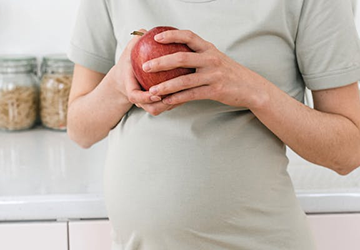Top 10 Pregnancy Superfoods for a Nutrient-Rich Diet
Conception is a voyage of wonders, a time of great joy, expectation, and extreme care for both the mother and the unborn child. Nutrition is one of the most important components of this trip. To optimize the health and development of the developing fetus and promote the overall well-being of the expecting mother, consuming a nutritionally balanced meal is imperative from the onset of conception.

All foods are essential for a healthy meal, but some are balanced because they contain vital vitamins, minerals, and antioxidants. To have a meal-dense conception, every pregnant woman should incorporate the top 10 conception-balanced meals into her meal.
Salmon
Omega-3 fatty acids, especially docosahexaenoic acid (DHA), make salmon one of the best meals for conception. The neurodevelopment and visual acuity of the infant are significantly reliant upon the presence of docosahexaenoic acid (DHA). Salmon also offers high-quality protein, which is necessary for developing and maintaining tissues in the fetus and the mother.
Leafy Greens
Leafy greens like kale, spinach, and Swiss chard are nutritious powerhouses. They are dense in fibre, iron, calcium, and folate. Folate, paramount in the initial phases of conception, safeguards the developing embryo against neural tube defects. Meanwhile, the production of erythrocytes, vital for oxygen transport to maternal and fetal circulatory systems, is contingent upon iron availability.
Greek Yoghurt
Fetus skeletal and dental maturation necessitate calcium, a nutrient abundantly supplied by Greek yogurt. Additionally, it offers probiotics, which are good bacteria that promote intestinal health and may lower a pregnant woman's risk of preeclampsia and gestational diabetes.
Berries
Berries, including strawberries, blueberries, and raspberries, are abundant in antioxidants, vitamins, and fibre. Fibre facilitates digestion and helps avoid constipation, a common symptom, while antioxidants help shield cells from harm by free radicals.
Eggs
Eggs are rich in high-quality protein, vitamins and minerals, making them a nutrient-dense meal. They supply choline, a vitamin necessary for the mother's and baby's brain growth and cognitive performance. Additionally, eggs contain zeaxanthin and lutein, two antioxidants critical to eye health.
Legumes
Plant-based protein, fibre, folate, iron, and calcium sources include legumes like lentils, chickpeas, and black beans. Additionally, they have a low glycemic index, which may lower the risk of gestational diabetes and help control blood sugar levels.
Sweet potatoes
Packed with beta-carotene, a form of vitamin A that aids in the development of a baby's skin, eyes, and immune system, sweet potatoes are a nutritional powerhouse. They also supply potassium, fibre, and vitamin C—meals critical to general health and well-being.
Avocado
Avocados are a unique fruit packed with fibre, vitamins, minerals, and good fats. Conception benefits from folate, magnesium, vitamin K, and antioxidant vitamin E. The monounsaturated fats found in avocados may reduce the risk of premature birth and preeclampsia.
Nuts and Seeds
Nuts and seeds are a mealy-dense snack. They are dense in protein, good fats, vitamins, and minerals. They supply vital minerals, including zinc, magnesium, and omega-3 fatty acids, which promote the growth and maturation of the baby's immune system, bones, and neurological system.
Lean Meats
Lean meats, which are dense in superior protein, iron, and zinc, include lean beef, chicken, and hog. Iron deficiency anaemia, a common conception illness that can cause exhaustion and other difficulties, can be prevented by taking iron supplements. Zinc is essential for DNA synthesis and immune system performance.
Conception Balanced Meals: The Benefits of a Mealy-Dense Food
Starting a conception is an incredible and physically and emotionally life-changing experience. Meals are vital to expecting moms' efforts to provide their developing newborns with the best environment possible. Conception-balanced meals have several advantages that improve fetal development and mother health when incorporated into a mealy-dense meal. Let's examine these balanced meals' advantages in more detail and see how they support a happy and healthy conception:

Ideal Foetal Development:
Conception-balanced meals contain a wealth of vital nutrients, including omega-3 fatty acids, iron, calcium, folate, and vitamins A, C, and D. These nutrients are essential for the growth and development of the fetus. They help the growing baby's critical organs, bones, and tissues form, creating the groundwork for a healthy start in life.
Decreased Risk of Birth Abnormalities:
When taken as a supplement, folate, also known as folic acid, is especially crucial in the early stages of conception because it helps prevent neural tube abnormalities, including anencephaly and spina bifida. Due to their high folate content, leafy greens, beans, citrus fruits, and boosted grains are essential for a pregnant woman's meal.
Enhanced Brain and Eye Development:
DHA (docosahexaenoic acid), in particular, is an omega-3 fatty acid that is esse
Initial for the brain and eyes of developing infants. During conception, eating foods high in omega-3s, such as walnuts, salmon, and flaxseeds, may help the fetus's eyesight and cognitive abilities.
Stronger Immune System:
Pregnant women who eat healthy meals can better maintain their immune systems, lowering their risk of infections and diseases. Vitamin C and E-dense foods, such as almonds, citrus fruits, and berries, support the immune system and offer antioxidant defence against oxidative stress.
Healthy Weight Management:
Balanced meals during conception are abundant in critical meals compared to their calorie level, making them mealy-dense. Pregnant women may satisfy their nutritional needs without consuming too many calories by including these items in a balanced meal, which will encourage healthy weight growth throughout conception and lower their risk of issues like gestational diabetes and preeclampsia.
Better Digestive Health:
Due to hormonal changes and the pressure of the expanding uterus, constipation is a frequent pain during conception. Foods high in fibre, such as leafy greens, whole grains, and legumes, help with digestion and prevent constipation. Consuming enough fibre eases digestive pain and encourages regular bowel movements, which improves general comfort and well-being.
The Bottom Line!
By including these delivery-balanced meals in your regular meals, you can ensure that you and your unborn child get the vital meals required for a successful conception. But it's essential to keep in mind that diversity is crucial. To get a wide variety of meals and flavours, try to eat varied meals.
Additionally, to customize your meal to your unique nutritional needs and tastes throughout conception, speak with your healthcare practitioner or a trained dietitian. You may start this incredible journey with confidence and energy by providing your body with meals high in calories.




